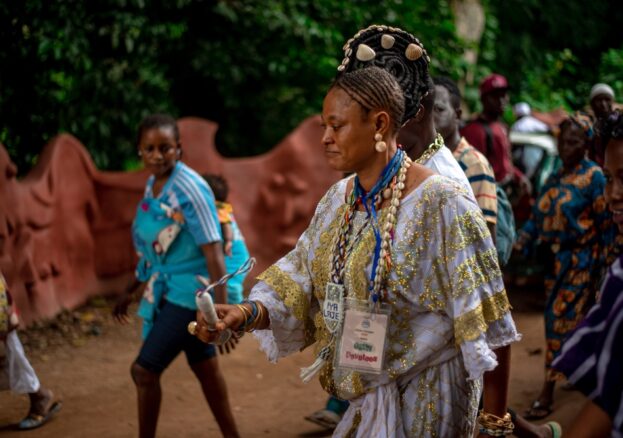
This sacred practice is particularly prevalent in Haiti, Africa, and Latin America, where it plays a central role in shaping cultural identity, fostering a sense of belonging, and connecting present generations with their rich past.
In these regions, ancestral veneration is not just a ritual; it is a profound spiritual and communal experience that permeates all aspects of life. This article explores the significance of honouring ancestors in Haiti, Africa, and Latin America, shedding light on the customs, beliefs, and rituals that bind communities together across generations.
Honouring Ancestors in Haiti
Haiti, the first independent nation in Latin America and the Caribbean, holds a vibrant and diverse cultural heritage, shaped by a fusion of African, European, and indigenous influences. Central to Haitian spirituality is the practice of honouring ancestors, often referred to as “Vodou” (Voodoo). In Vodou, ancestors are believed to continue to exist in the spirit world, guiding and protecting their living descendants.
Ancestral veneration in Haiti involves elaborate ceremonies, music, dance, and offerings to appease and communicate with the spirits. Practitioners gather at sacred sites, known as “peristyles,” to connect with their ancestors. They invoke the lwa (spirits) through song, drumming, and dance, seeking their wisdom and blessings. Offerings of food, rum, and other symbolic items are made to show respect and gratitude to the ancestors.
The practice of honouring ancestors in Haiti extends beyond religious rituals; it permeates daily life. Families maintain altars at home adorned with pictures, candles, and offerings, symbolizing a continuous connection with deceased relatives. The wisdom and experiences of ancestors are passed down through oral storytelling, preserving cultural traditions and promoting a strong sense of community.
Ancestral Veneration in Africa
Across the vast and diverse continent of Africa, the honouring of ancestors is deeply rooted in cultural and spiritual practices. Specific beliefs and rituals vary among different African tribes and communities, but a common thread runs through them: ancestors hold a powerful influence on the living.
In many African societies, ancestors are revered as intermediaries between the human realm and the spirit world. Offerings of food, water, and other goods are presented to ancestors at designated shrines or burial sites to seek their guidance, protection, and blessings. The wisdom of ancestors is considered invaluable, and their advice is sought during important decision-making processes.
Music and dance play an essential role in ancestral veneration in Africa. Rhythmic drumming and spirited dances are performed during ceremonies and rituals, channelling the energy of the ancestors and fostering a sense of unity among the living.
Latin America’s Ancestral Connections
Latin America, a region rich in cultural diversity, boasts a deep reverence for ancestors across various countries and indigenous communities. Pre-Columbian civilizations, such as the Aztecs, Mayans, and Incas, practiced elaborate rituals to honour their ancestors and divine deities.
In modern times, the tradition of honouring ancestors has merged with the influence of colonial and Christian beliefs, creating a unique syncretic expression of ancestral veneration. Latin American communities often commemorate their ancestors during specific holidays, such as Dia de los Muertos (Day of the Dead) in Mexico, which involves creating colourful altars adorned with photographs, candles, and offerings to welcome the spirits of loved ones back to the earthly realm.
In indigenous communities throughout Latin America, ancestral veneration remains deeply ingrained in daily life. Rituals, dances, and ceremonies are performed to maintain a connection with the past and to seek guidance from departed ancestors in matters concerning health, agriculture, and community harmony.
Conclusion
The practice of honouring ancestors in Haiti, Africa, and Latin America is a deeply spiritual and communal tradition that weaves together the fabric of cultural identity and historical continuity. Through rituals, music, dance, and storytelling, these societies celebrate their shared past, seek guidance from their ancestors, and foster a strong sense of belonging among the living.
Honouring ancestors is not merely an archaic remnant of the past; it remains an integral part of the present, shaping the values, customs, and social structures of these vibrant cultures. By cherishing the wisdom and experiences of their ancestors, the people of Haiti, Africa, and Latin America forge a connection that transcends time, creating a bridge between the past, the present, and the future.
